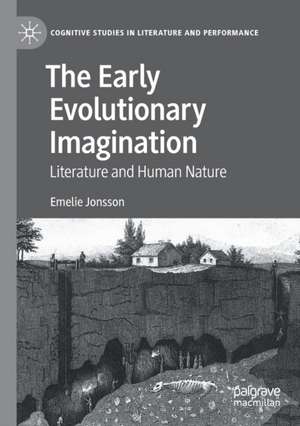The Early Evolutionary Imagination: Literature and Human Nature: Cognitive Studies in Literature and Performance
Autor Emelie Jonssonen Limba Engleză Paperback – oct 2022
| Toate formatele și edițiile | Preț | Express |
|---|---|---|
| Paperback (1) | 725.26 lei 6-8 săpt. | |
| Springer International Publishing – oct 2022 | 725.26 lei 6-8 săpt. | |
| Hardback (1) | 727.97 lei 6-8 săpt. | |
| Springer International Publishing – 30 sep 2021 | 727.97 lei 6-8 săpt. |
Din seria Cognitive Studies in Literature and Performance
-
 Preț: 303.28 lei
Preț: 303.28 lei -
 Preț: 299.96 lei
Preț: 299.96 lei - 8%
 Preț: 537.27 lei
Preț: 537.27 lei -
 Preț: 302.20 lei
Preț: 302.20 lei -
 Preț: 299.34 lei
Preț: 299.34 lei -
 Preț: 301.10 lei
Preț: 301.10 lei -
 Preț: 381.98 lei
Preț: 381.98 lei -
 Preț: 392.37 lei
Preț: 392.37 lei -
 Preț: 386.81 lei
Preț: 386.81 lei - 15%
 Preț: 644.18 lei
Preț: 644.18 lei -
 Preț: 393.52 lei
Preț: 393.52 lei - 18%
 Preț: 784.92 lei
Preț: 784.92 lei - 15%
 Preț: 640.88 lei
Preț: 640.88 lei -
 Preț: 384.86 lei
Preț: 384.86 lei - 15%
 Preț: 647.08 lei
Preț: 647.08 lei - 15%
 Preț: 698.62 lei
Preț: 698.62 lei - 18%
 Preț: 730.02 lei
Preț: 730.02 lei - 15%
 Preț: 586.88 lei
Preț: 586.88 lei - 15%
 Preț: 528.13 lei
Preț: 528.13 lei - 15%
 Preț: 584.43 lei
Preț: 584.43 lei - 15%
 Preț: 587.02 lei
Preț: 587.02 lei - 18%
 Preț: 725.26 lei
Preț: 725.26 lei - 18%
 Preț: 730.97 lei
Preț: 730.97 lei - 15%
 Preț: 699.77 lei
Preț: 699.77 lei - 15%
 Preț: 640.88 lei
Preț: 640.88 lei
Preț: 725.26 lei
Preț vechi: 884.46 lei
-18% Nou
Puncte Express: 1088
Preț estimativ în valută:
138.82€ • 150.84$ • 116.69£
138.82€ • 150.84$ • 116.69£
Carte tipărită la comandă
Livrare economică 21 aprilie-05 mai
Preluare comenzi: 021 569.72.76
Specificații
ISBN-13: 9783030827403
ISBN-10: 3030827402
Pagini: 300
Ilustrații: XII, 300 p. 1 illus.
Dimensiuni: 148 x 210 mm
Greutate: 0.38 kg
Ediția:1st ed. 2021
Editura: Springer International Publishing
Colecția Palgrave Macmillan
Seria Cognitive Studies in Literature and Performance
Locul publicării:Cham, Switzerland
ISBN-10: 3030827402
Pagini: 300
Ilustrații: XII, 300 p. 1 illus.
Dimensiuni: 148 x 210 mm
Greutate: 0.38 kg
Ediția:1st ed. 2021
Editura: Springer International Publishing
Colecția Palgrave Macmillan
Seria Cognitive Studies in Literature and Performance
Locul publicării:Cham, Switzerland
Cuprins
1. Chapter 1: Using Evolution to Explain the Evolutionary Imagination.- Chapter 2 Myth-Making in Early Evolutionary Thought.- Chapter 3: Darwinism in Literature.- Chapter 4: From Adventure to Utopia.- Chapter 5: Jack London’s Evolutionary Imagination.- Chapter 6: H. G. Wells’s Evolutionary Imagination.- Chapter 7: Joseph Conrad’s Evolutionary Imagination.- The Unimaginable Place in Nature.
Notă biografică
Emelie Jonsson is Assistant Professor of English literature at the Arctic University of Norway, UiT, and Associate Editor of Evolutionary Studies in Imaginative Culture. Her research centers on the friction between human psychology and naturalistic cosmology.
Textul de pe ultima copertă
“Jonsson is the first scholar in this historical field to assimilate the most recent empirical knowledge about our evolved human nature and the psychology of imagination. Her theoretical framework provides robust explanatory power, her interpretive critiques are incisive and authoritative, and her style is lucid and vigorous. Like the best critics of any literary school, she evokes the whole imaginative world view of the authors she discusses.”
--Joseph Carroll, Curator’s Distinguished Professor Emeritus, University of St. Louis, Missouri, USA
“Jonsson’s new book is brilliantly conceived, elegantly written, and deeply illuminating. Her premise is that Darwinian thinking represented a profound challenge to the foundational concepts of literary culture—the autonomy of the individual, the meaningfulness of human life, the importance of moral choice, and the value of art. Her argument is that literary culture in the years following Darwin explored ways of confronting this challenge, opening up a space between difficult truths and soothing fictions, and making it possible for people to grasp the unique disturbance of the Darwinian message without being destroyed by its implications.”
--Geoffrey Harpham, senior fellow at the Kenan Institute for Ethics, Duke University, USA
--Joseph Carroll, Curator’s Distinguished Professor Emeritus, University of St. Louis, Missouri, USA
“Jonsson’s new book is brilliantly conceived, elegantly written, and deeply illuminating. Her premise is that Darwinian thinking represented a profound challenge to the foundational concepts of literary culture—the autonomy of the individual, the meaningfulness of human life, the importance of moral choice, and the value of art. Her argument is that literary culture in the years following Darwin explored ways of confronting this challenge, opening up a space between difficult truths and soothing fictions, and making it possible for people to grasp the unique disturbance of the Darwinian message without being destroyed by its implications.”
--Geoffrey Harpham, senior fellow at the Kenan Institute for Ethics, Duke University, USA
Darwinian evolution is an imaginative problem that has been passed down to us unsolved. It is our most powerful explanation of humanity’s place in nature, but it is also more cognitively demanding and less emotionally satisfying than any myth. From the publication of the Origin of Species in 1859, evolution has pushed our capacity for storytelling into overdrive, sparking fairy tales, adventure stories, political allegories, utopias, dystopias, social realist novels, and existential meditations. Though this influence on literature has been widely studied, it has not been explainedpsychologically. This book argues for the adaptive function of storytelling, integrates traditional humanist scholarship with current knowledge about the evolved and adapted human mind, and calls for literary scholars to reframe their interpretation of the first authors who responded to Darwin.
Emelie Jonsson is Assistant Professor of English literature at the Arctic University of Norway, UiT, and Associate Editor of Evolutionary Studies in Imaginative Culture. Her research centers on the friction between human psychology and naturalistic cosmology.
Caracteristici
Assimilates traditional humanist scholarship Integrates it with current knowledge about the evolved and adapted human mind Uses research on the imagination to argue for the adaptive function of storytelling
